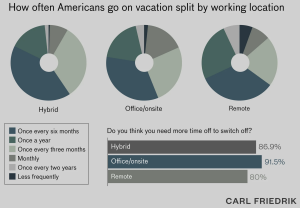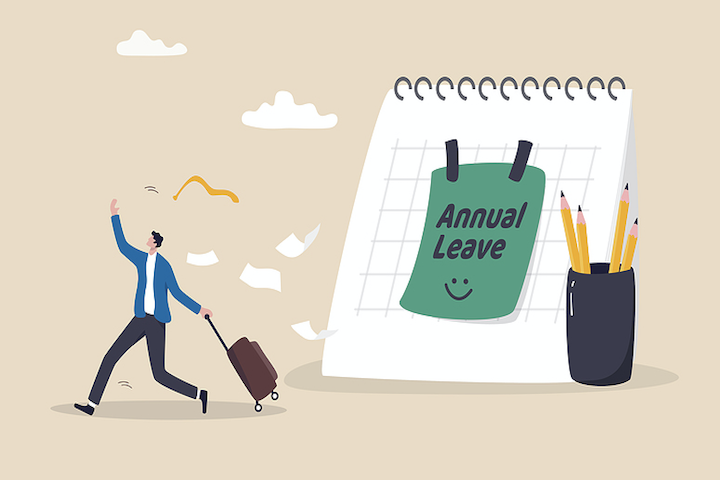Well, we made it – 2024 is here!
The Christmas/New Year festivities are over; it’s back to work, and for some that means back with a bump.
Because another year lies ahead. Another busy one maybe.
Perhaps it’s no wonder some staff may already be planning what time they intend to take off in the coming 12 months.
That’s a good thing, but as staff get back to the working groove, there’s new data HR professionals should find interesting – data that appears to find a connection between where people work with how much time off they’re likely to take.
According to research by luxury travel brand, Carl Friedrik, it’s remote workers that seem to take the fewest number of days off, while those who work in an office take the most.
The data reveals that those who work in an office feel they need more time to switch off compared to remote workers – by some considerable distance.
Some 91.5% of workers who are onsite say they need more time to switch off – compared to 80% amongst those who work remotely.
This need to recover/recuperate is reflected in holiday uptake statistics.
Onsite office workers are the most likely category of employee to book monthly trips away (16.6%), and they are most likely to want to take time off every three months: nearly 26% do, compared to 21% amongst those who work remotely.
The data also reveals that remote workers were the most likely to book a trip annually (25%), or every two years or even less frequently.


What does this mean for HR?
Everyone knows American workers already have fewest holiday days to start with, and to make matter worse, most staff fail to take what they’re allocated [often due to reasons HR is responsible for – like staff feeling under pressure not to be away, or guilt for heaping work on their co-workers].
But this new data suggests that there is an interesting location dynamic that could now be impacting their time-off choices too.
– Remote means relaxed and more refreshed?
Could it be that remote workers – those who don’t face that agony of the daily commute in, or have greater flexibility to work hours that suit their lives – are simply not as stressed out as their on-site counterparts, and so the need to unwind is less urgent?
– You’ve required staff to return to the office – but at what cost?
Could it be that return to office policies will see new spikes in demand for holiday this year that may not have been anticipated, as staff find the office environment more stressful and over-powering?
Either sound plausible, but it you think about it, neither scenarios are actually that great.
While the data is still mixed around the health/stress/wellbeing pros and cons of working remotely [some data suggests remote work heightens anxiety and feeling more disconnected; whilst other research points to it being less stressful and allows people to prioritize themselves] – if staff think that working remote is somehow a benefit over their in-office colleagues, and so they need/deserve less holiday, this is a bad thing.
Experts generally concur most employees need to be taking more holiday, not less, and that even if remote working in less stressful for some, proper time off is needed to fully charge one’s batteries.
For those who are in the office meanwhile, the need for more holiday could be reflective of office working now being regarded as less desirable.
It could be that staff are simply stepping up, and feel that if they are being asked to work on-site, they definitely deserve their entire allotted time off.
If this is the case, the tendency for on-site staff to need more holiday could be hiding resentment about on-site working in the first place. CHRO’s might well want to reconsider their return to office policies.
It’s worth noting too that the data also shows remote workers are almost twice as likely to feel satisfied with the time off they took, whereas 93.6% of office workers said they needed more time off to properly switch off.
Make staff taking their holiday your New Year’s Resolution
By any yardstick, taking time off is important.
Employers have been criticized in the past for passively allowing low levels of holiday take-up, and effectively ‘gaining’ free work from staff by not reminding/encouraging them to take what’s owed.
But as we start this New Year off, perhaps this new data is a wake-up call to encourage HR professionals to start looking at their own holiday usage data more precisely, to see if they’re experiencing any location-based differences too.
Every employee should be encouraged by HR to take what’s statutorily theirs, and good employers should be promoting the value of taking all their holiday rather than seeing any unspent holiday as extra unpaid toil they’ve profited from.
Maybe this New Year, one of HR professionals’ resolutions should be making sure people take what owed to them – wherever it is they work.
Best of the rest:
What the data also revealed:
* Eight in ten Americans experience stress whilst preparing for or returning from vacation
* Only 11.3% of Americans typically plan a trip for more than 8 days
* Americans were most likely to plan a vacation twice a year (35.7%)
* The majority (79.5%) take between 3 to 7 days off
* Nine in ten Americans find slow travel appealing, but 25% say lack of paid time off prevents them from doing it
